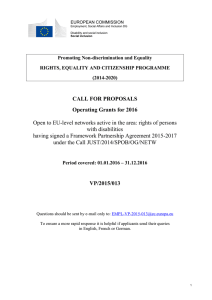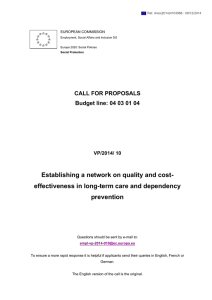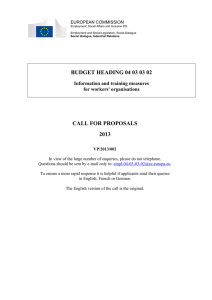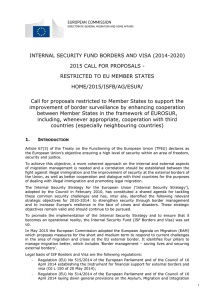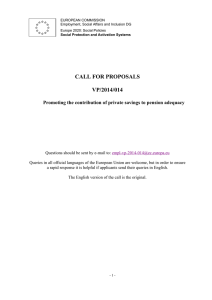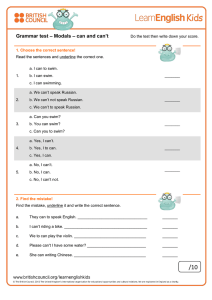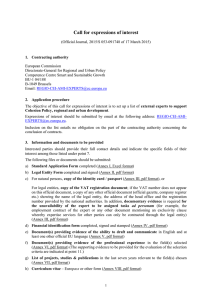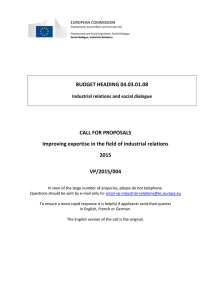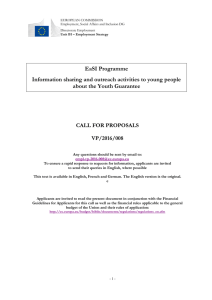CALL FOR PROPOSALS to support national projects on a
Anuncio
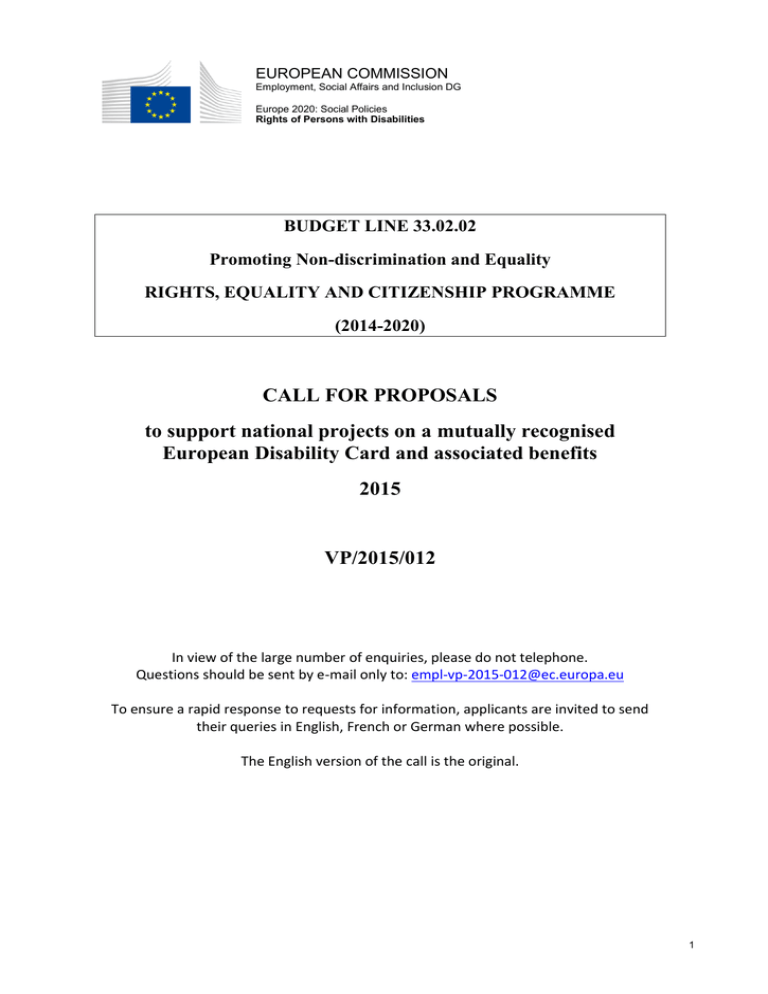
EUROPEAN COMMISSION Employment, Social Affairs and Inclusion DG Europe 2020: Social Policies Rights of Persons with Disabilities BUDGET LINE 33.02.02 Promoting Non-discrimination and Equality RIGHTS, EQUALITY AND CITIZENSHIP PROGRAMME (2014-2020) CALL FOR PROPOSALS to support national projects on a mutually recognised European Disability Card and associated benefits 2015 VP/2015/012 In view of the large number of enquiries, please do not telephone. Questions should be sent by e-mail only to: [email protected] To ensure a rapid response to requests for information, applicants are invited to send their queries in English, French or German where possible. The English version of the call is the original. 1 TABLE OF CONTENTS 1. INTRODUCTION – BACKGROUND ................................................... 3 2. OBJECTIVE, PRIORITIES AND ACTIVITIES TO BE FUNDED ................................................................................................. 4 3. TIMETABLE ........................................................................................... 6 4. BUDGET AVAILABLE ......................................................................... 7 5. ADMISSIBILITY REQUIREMENTS .................................................... 7 6. ELIGIBILITY CRITERIA....................................................................... 7 6.1. Eligible applicants ........................................................................... 7 6.2. Eligibility of applications ................................................................ 8 6.3. Implementation period .................................................................... 8 7. EXCLUSION CRITERIA ....................................................................... 8 7.1. Exclusion from participation: .......................................................... 8 7.2. Exclusion from award: .................................................................... 9 8. SELECTION CRITERIA ........................................................................ 9 8.1. Financial capacity ............................................................................ 9 8.2. Operational capacity ...................................................................... 10 9. AWARD CRITERIA ............................................................................. 10 10. LEGAL COMMITMENTS ................................................................... 11 11. FINANCIAL PROVISIONS ................................................................. 11 12. PUBLICITY ........................................................................................... 12 12.1. By the beneficiaries ....................................................................... 12 12.2. By the Commission ....................................................................... 12 13. DATA PROTECTION........................................................................... 12 14. PROCEDURE FOR THE SUBMISSION OF APPLICATIONS ......... 13 15. EVALUATION PROCESS ................................................................... 14 16. CONTACT ............................................................................................. 15 17. SUPPORTING DOCUMENTS ............................................................. 15 18. ANNEXES TO THE CALL DOCUMENT........................................... 16 2 1. INTRODUCTION – BACKGROUND There are approximately 80 million persons with disabilities in the European Union. The recognition of disability status and the allocation of related benefits are matters of national competence. There is no mutual recognition between Member States of the disability status. This makes things difficult for persons with disabilities travelling to another EU country, who are often not treated equally to nationals as their disability cards / status are not always recognised outside their countries. The European Disability Forum (EDF), an EU wide civil society organisation representing the 80 million persons with disabilities living in the EU, has consistently called for an EU-model Disability Card and issued a position paper in 2011.1 In 2012, EDF conducted a survey among its members and made recommendation on a common model European disability card for mutual recognition of disability status.2 To address this situation and to facilitate persons with disabilities' right to free movement, work started with a view to create a system of mutual recognition between the Member States based on a single European model disability card. One of the actions3 proposed with the European Disability Strategy 2010-20204 was to study the implications of a voluntary mutual recognition of disability cards and related entitlements. In 2011, the Academic Network of European Disability experts (ANED) produced the study "Disability Benefits and Entitlements in European Countries" and an annotated database of examples.5 The development of such a card was one of the actions put forward by the Commission in its EU Citizenship Report 2013.6 "Action 6: The Commission will facilitate the mobility of persons with disabilities within the EU by supporting, in 2014, the development of a mutually recognised EU disability card to ensure equal access within the EU to certain specific benefits (mainly in the areas of transport, tourism, culture and leisure)." The Citizenship report mentioned the launch of a pilot initiative to develop a mutually recognised EU disability card that would facilitate equal treatment of persons with disabilities who travel to other EU countries, when it comes to access to transport, tourism, culture, and leisure. In 2013, the Commission launched a Project Working Group (PWG) on the Disability Card with representatives of interested Member States7 and civil society (EDF). The PWG exchanged information on benefits granted at national level, discussed the packages of benefits that the Member States would be willing to make available to cardholders from other Member States, as well as discussed more practical issues such as the features of the card and how to make the mutual recognition system work. The PWG met four times, in July and October 2013, February and September 2014. 1 EDF's Proposal for a European Mobility Card (May 2011): http://www.edf-feph.org/Page_Generale.asp?DocID=27839 2 http://www.edf-feph.org/Page.asp?docid=29753&langue=EN 3 SEC/2010/1324 final: http://eur-lex.europa.eu/LexUriServ/LexUriServ.do?uri=CELEX:52010SC1324:EN:NOT 4 COM(2010) 636 final: http://eur-lex.europa.eu/LexUriServ/LexUriServ.do?uri=CELEX:52010DC0636:en:NOT 5 http://www.disability-europe.net/content/aned/media/ANED%202010%20Task%207%20%20Disability%20Benefits%20and%20Entitlements%20-%20Report%20-%20FINAL%20%282%29.pdf 6 http://ec.europa.eu/justice/citizen/files/2013eucitizenshipreport_en.pdf (see page 23) 7 http://ec.europa.eu/transparency/regexpert/index.cfm?do=groupDetail.groupDetail&groupID=1259&New Search=1&NewSearch=1 3 The action is in accordance with Article 21 (1) and 26 (2) of the Treaty on the Functioning of the European Union (TFEU), which read: - 21 (1) "Every citizen shall have the right to move and reside freely within the territory of the Member States (…)". 26 (2) "The internal market shall comprise an area without internal frontiers in which the free movement of goods, persons, services and capital is ensured in accordance with the provisions of the Treaties." In addition it is in line with Article 26 of the Charter of Fundamental Rights of the European Union: - "Integration of persons with disabilities The Union recognises and respects the right of persons with disabilities to benefit from measures designed to ensure their independence, social and occupational integration and participation in the life of the community." Finally, this action would contribute to the fulfilment of the EU's obligations deriving from the UN Convention on the Rights of Persons with Disabilities that the EU acceded to in 2011.8 The call is based on the annual work programme for the implementation of the Rights, Equality and Citizen Programme in 2014; the Commission Implementing Decision was approved on 24.4.2014 as C(2014) 2557 final.9 The Rights, Equality and Citizenship Programme 2014-2020 has nine objectives.10 The call is addressing the objective to promote rights of persons with disabilities. 2. OBJECTIVE, PRIORITIES AND ACTIVITIES TO BE FUNDED The EU Disability Card will be operational only in the Member States (to their nationals and residents) in which projects will be implemented as a result of this call. The objective is to support the creation of a Card that will imply mutual recognition of the disability status in the participating Member States. Such a Card will allow persons with disabilities from participating Member States travelling to other EU Member States also participating in the project to show they have a certified disability status in their home Member State. The Card will not change national eligibility criteria or rules. Member States will retain their discretion to decide who is eligible to receive the Card, using the national definition of disability, and to determine the issuing procedure. 8 http://www.un.org/disabilities/convention/conventionfull.shtml http://ec.europa.eu/justice/grants1/programmes-2014-2020/files/rec_awp_2014_act_en.pdf 10 1. Promote non–discrimination 2. Combat racism, xenophobia, homophobia and other forms of intolerance 3. Promote rights of persons with disabilities 4. Promote equality between women and men and gender mainstreaming 5. Prevent violence against children, young people, women and other groups at risk (Daphne) 6. Promote the rights of the child 7. Ensure the highest level of data protection 8. Promote the rights deriving from Union citizenship 9. Enforce consumer rights 9 4 In the areas covered by the Card, national service providers would provide to holders of the EU Disability Card the same benefits as to national card holders, thus allowing equal treatment of persons with disabilities who travel to other EU countries and facilitating their mobility. Benefits to be granted are in some or all of the following areas: culture, leisure, transports and sport in the form of price reductions/discounts, free entrances or services. This flexible approach in the package of areas to be covered was favoured by most of the Member States participating in PWG. This Card will not change the benefits offered at national level, it would simply make certain benefits, as determined by each participating Member State, available to holders of the Card from other Member States. As concerns the features of the Card, it will have a common format, agreed at EU-level (harmonised design). The card will have simple features to allow its production with a minimum cost. There should be a picture on the Card, a name and an expiry date. The production of the card will be done at national level, as is the case for the EU model Parking Card for persons with disabilities. A simple and accessible EU webpage on "europa" will be created with links to the national websites where further information could be found, also available in accessible format to persons with disabilities: http://ec.europa.eu/ipg/standards/accessibility/index_en.htm Description of priorities and activities to be funded under this call for proposals: The call aims to support the launch and start-up up phase of the EU Disability Card in the Member States that are participating in the Project Working Group.11 In particular the support will contribute to: Priority 1: Setting up or reinforcing the respective EU Disability Card national organisations (DCNOs: governmental or non-governmental entities) whose main tasks will be: a) issuing the card; and b) maintaining contacts with service providers regarding the benefits to be included. Support will in particular contribute to these activities: the organisational set up or reinforcement of the DCNO, including the reinforcement of human resources (such as hiring of additional staff) and/or material resources (such as purchasing the necessary equipment and software); the issuing of the EU Disability Card (using the common design), production, printing, issuing of the card and the establishment of anti-fraud measures. 11 Belgium, Bulgaria, Cyprus, Estonia, Finland, France, Germany, Greece, Hungary, Italy, Malta, Poland, Portugal, Romania, Slovakia, Slovenia and Spain 5 Priority 2: Establishing the respective national package of benefits that Member States are ready to mutualise and taking the necessary national measures to make that possible. Support will in particular contribute to these activities: the collection of data, creation of a list of benefits provided, for example by means of a database; an information and publicity campaign both towards users and towards providers; creating the national website with clear information also in accessible format on responsible bodies and benefits provided and allowing its link with the EU webpage. The International Day of Persons with Disabilities on 3 December 2016 should be a milestone in the implementation of the selected actions. By this date, either the Card should be issued or an important stage of implementation should be reached (e.g. the system in place, important awareness raising action / campaign concluded). The EU will use this date to announce that the EU Disability Card is operational in some EU Member States. Applicants must demonstrate in their proposal that they accept the main principles for cooperating in the EU Disability Card system (including the common design of the Card) and how they intend to ensure its sustainability after the finalisation of this action (see award criteria under section 9). The EU Disability Card should be sustainable and not dependent on continued EU funding. The Commission intends to fund one proposal per Member State participating in the Project Working Group; in the case of involvement of several eligible entities in the same Member State, the application should be introduced by a consortium (lead applicant + coapplicant(s)). 3. TIMETABLE Stages Date or period a) Publication of the call July 2015 b) Deadline for submitting applications c) Evaluation period (indicative) d) Information to applicants (indicative) November 2015 e) Signature of grant agreement or notification of grant decision December 2015 f) Starting date of the action/ work programme 30 September 2015 October-November 2015 Within 2 months after the grant agreement signature 6 4. BUDGET AVAILABLE The total budget earmarked for the co-financing of projects under this call for proposals is estimated at EUR 1,550,000. The requested EU contribution cannot exceed 80% of the total eligible costs of the action. The applicant must guarantee the co-financing of the remaining 20% covered from sources other than the budget of the European Union. Applicant(s) must submit with their application a letter (or letters) of commitment confirming the amount of their co-financing (see Annex II – checklist item n°5). Contributions in kind are not accepted as co-financing. The requested EU contribution cannot be lower than EUR 75 000. The Commission intends to fund 1 proposal per Member State. The Commission reserves the right not to distribute all the funds available. 5. ADMISSIBILITY REQUIREMENTS Applications must be submitted electronically and sent in hard copy no later than the deadline for submitting applications referred to in section 3(b). Applications must be submitted in writing (see section 14), using the application form and electronic submission system available at https://webgate.ec.europa.eu/swim as well as in paper version by post or courier service (see sections 14 and 15). Failure to comply with those requirements will lead to the rejection of the application. Applicants are encouraged to submit their project proposal in English to facilitate treatment of the proposals and speed up the evaluation process. It should be noted, however, that applications in all official languages of the EU will be accepted. All proposals should be accompanied by an executive summary in English, French or German (checklist point 3). 6. ELIGIBILITY CRITERIA 6.1. Eligible applicants To be eligible, grant applicants must comply with all the following criteria: Applicants (sole applicants or, in the case of a consortium, lead applicant and coapplicants) must: Be properly constituted and registered legal entities, having their registered office in one of the EU Member States participating in the Project Working Group on the development of the EU Disability Card (PWG)12; Be either a public entity or non-profit organisation officially designated in writing by the relevant national authority. 12 Belgium, Bulgaria, Cyprus, Estonia, Finland, France, Germany, Greece, Hungary, Italy, Malta, Poland, Portugal, Romania, Slovakia, Slovenia and Spain 7 In order to assess the applicants' eligibility, the supporting documents relating to their legal status indicated in Annex II and, in the case of consortia, a letter of commitment and a mandate are requested. 6.2. Eligibility of applications To be eligible, applications must: Concern actions to be fully carried out in one of the Member States participating in the Project Working Group; Comply with the EU co-financing percentage of maximum 80% as set in section 4; Not request an EU contribution of less than EUR 75 000. Be complete and include all the documents indicated in the table in Annex II. At the submission of the application, copies of the signed originals will be accepted for most of the documents to be submitted by the co-applicants. However, the lead applicant shall keep the original signed versions for its records because originals may have to be submitted for certain documents at a later stage. If the lead applicant fails to submit these original documents within the deadline given by the Commission, the application will be rejected for lack of compliance with this eligibility criterion. 6.3. Implementation period Activities must start within two months after the signature of the grant agreement. The indicative duration of activities can be up to 18 months. Applications for projects scheduled to run for a longer period will not be accepted. Applicants should note that they may receive the grant agreement after the start date of the action that they have foreseen. It is, therefore, advisable to number the months in the work programme instead of indicating the name of the months in order to avoid having to provide an updated action plan if the project should be selected. Nevertheless, any expenditure incurred before signature of the grant agreement by both parties is at the applicant's risk. 7. EXCLUSION CRITERIA Applicants (= lead and co-applicant(s)) must be in conformity with Articles 106(1) and 107 to 109 of the Financial Regulation. 7.1. Exclusion from participation: Applicants will be excluded from participating in the call for proposals procedure if they are in any of the following situations: (a) they are bankrupt or being wound up, are having their affairs administered by the courts, have entered into an arrangement with creditors, have suspended business activities, are the subject of proceedings concerning those matters, or are in any analogous situation arising from a similar procedure provided for in national legislation or regulations; (b) they or persons having powers of representation, decision making or control over them have been convicted of an offence concerning their professional conduct by a 8 judgment of a competent authority of a Member State which has the force of res judicata; (c) they have been guilty of grave professional misconduct proven by any means which the contracting authority can justify including by decisions of the EIB and international organisations; (d) they are not in compliance with their obligations relating to the payment of social security contributions or the payment of taxes in accordance with the legal provisions of the country in which they are established or with those of the country of the RAO or those of the country where the grant agreement is to be performed; (e) they or persons having powers of representation, decision making or control over them have been the subject of a judgment which has the force of res judicata for fraud, corruption, involvement in a criminal organisation, money laundering or any other illegal activity, where such an illegal activity is detrimental to the Union's financial interests; (f) they are currently subject to an administrative penalty referred to in Article 109(1) of the Financial Regulation. 7.2. Exclusion from award: In accordance with Article 107 of the Financial Regulation, applicants will not be granted financial assistance if, in the course of the grant award procedure, they: (a) are subject to a conflict of interest; (b) are guilty of misrepresentation in supplying the information required by the Commission as a condition of participation in the grant award procedure or fail to supply this information; (c) find themselves in one of the situations of exclusion, referred to in section 7.1. Administrative and financial penalties may be imposed on applicants, or affiliated entities where applicable, who are guilty of misrepresentation. Applicants must sign a declaration on their honour certifying that they are not in one of the situations referred to in articles 106(1) and 107 to 109, filling in the relevant form attached to the application form accompanying the call for proposals (see Annex II). 8. SELECTION CRITERIA Only organisations with the necessary financial and operational capacity described below may be considered for the award of a grant. Financial and operational capacity of the applicant must correspond to the following definitions: 8.1. Financial capacity Applicants (= lead and co-applicant) must have stable and sufficient sources of funding to maintain their activity throughout the period during which the action is being carried out or the year for which the grant is awarded and to participate in its funding. The applicants' financial capacity will be assessed on the basis of the following supporting documents to be submitted with the application: a declaration on their honour; the profit and loss account, the balance sheet for the last financial year for which the accounts were closed; 9 profit and loss accounts and balance sheet summary using the template provided in SWIM signed by the legal representative. For grants request for more than EUR 750 000, additionally: an audit report produced by an approved external auditor certifying the accounts for the last financial year available. In the case of an application grouping several applicants (consortium), the above threshold applies per applicant. The verification of financial capacity will not apply to public bodies. 8.2. Operational capacity Applicants (= lead and co-applicant(s)) must have the operational and professional competencies as well as appropriate qualifications to implement and/or coordinate the proposed action taking into account the specific requirements for the implementation of the EU Disability Card and to maintain its activities during the period of implementation of the proposed action. However, the RAO may, depending on a risk assessment, waive the obligation to verify the operational capacity of public bodies. The operational capacity should be proven by the declaration on honour and the curriculum vitae mentioned in Annex II, as well as the information provided in the required sections (F.1 and F.3) of the SWIM application form on the operational structure of the lead and co-applicants and on previous and current actions undertaken by them. --------------If the lead applicant is considered not to have the required financial or operational capacity, the application as a whole will be rejected. If a co-applicant is considered not to have the required financial or operational capacity, this co-applicant will be removed from the consortium and the application will be evaluated on that basis. In addition, the costs that are allocated to the non-eligible co-applicant will be removed from the budget. If the application is accepted, the work programme will have to be adapted as appropriate. 9. AWARD CRITERIA The grants will be awarded following an assessment of the proposals on the basis of the following criteria. Only proposals obtaining at least 60 points and at least 50% of the maximum number of points for each criterion can be selected for funding. (a) Relevance to the priorities of the call for proposals (25 points): Relevance of the action and its objectives to the priorities of the call for proposals, as described under section 2 of this call notice. (b) Quality of the proposed action (25 points): Quality in terms of the proposed methodology for implementing the activities; the organisation of work, the allocation of resources and the time schedule; the appropriateness of the envisaged activities; the strategy for monitoring of the project implementation and the proposed evaluation; the identification of risks and the measures to mitigate them; preliminary work done within the Project Working Group. 10 (c) European added value of the project (10 points): The European added value of the project shall be assessed in the light of criteria such as its contribution to the consistent and coherent implementation of Union policies and to wide public awareness, its potential to develop mutual trust among Member States and to improve cross-border cooperation, and its contribution to the elaboration and dissemination of best practices. (d) Expected results, dissemination, sustainability and long-term impact (30 points): How appropriate are the expected results to achieve the objectives of the action? Is there a long-term impact of these results on the target groups and/or the general public? A clear, targeted and appropriate dissemination strategy, which will ensure that the results and/or lessons learnt will reach the target groups and/or the general public? Does the proposal demonstrate acceptance of the main principles for cooperating in the EU Disability Card system (including the common design of the card)? Is sustainability of the activities after the EU funding ensured? (e) Cost-effectiveness (10 points): Financial feasibility of the proposed activities by means of a realistic and reasonable budget. Appropriateness of the amount requested in relation to the scale and type of the activities, to the expected results and to the size of the consortium. Appropriateness of management and coordination costs. 10. LEGAL COMMITMENTS In the event of a grant awarded by the Commission, a grant agreement drawn up in euro and detailing the conditions and level of funding, will be sent to the beneficiary, as well as the procedure in view to formalise the obligations of the parties. The two copies of the original agreement must be signed first by the beneficiary (by the Coordinator in the case of a consortium) and returned to the Commission immediately. The Commission will sign last. 11. FINANCIAL PROVISIONS For more detailed information on the financial and administrative aspects of the call please see Annex I which is available on the call website: http://ec.europa.eu/social/main.jsp?catId=629&langId=en The Financial Guidelines for Applicants provide more detailed information for the applicants, especially as regards guidelines for presenting the proposal's provisional budget along with the rules governing which categories of expenditure are eligible and which are not. Only eligible costs can be taken into account for determining the amount of grant. For implementation contracts, the beneficiary must award the contract to the bid offering best value for money or the lowest price (as appropriate), avoiding conflicts of interests and retaining the documentation for the event of an audit. Further information on subcontracting and implementing contracts is contained in the financial guidelines (Annex I). 11 The overall coordination and management, as well as the financial management of the project cannot be sub-contracted. Procedures to award contracts may have been initiated, but contracts may not be concluded by the beneficiaries before the start of the implementation of the projects. 12. PUBLICITY 12.1. By the beneficiaries Beneficiaries must clearly acknowledge the European Union’s contribution in all publications or in conjunction with activities for which the grant is used. In this respect, beneficiaries are required to give prominence to the name and emblem of the European Commission on all their publications, posters, programmes and other products realised under the co-financed project using the guidelines available at http://ec.europa.eu/dgs/communication/services/visual_identity/pdf/use-emblem_en.pdf. Any communication or publication by the beneficiary/ies related to the action, in any form and using any means, including the Internet, shall indicate that it reflects only the author's view and that the Commission is not responsible for any use that may be made of the information it contains. If these requirements are not fully complied with, the beneficiary’s grant may be reduced in accordance with the provisions of the grant agreement. 12.2. By the Commission With the exception of scholarships paid to natural persons and other direct support paid to natural persons in most need, all information relating to grants awarded in the course of a financial year shall be published on an internet site of the European Union institutions no later than the 30 June of the year following the financial year in which the grants were awarded. The Commission will publish the following information: - name of the beneficiary - address of the beneficiary when the latter is a legal person, region when the beneficiary is a natural person, as defined on NUTS 2 level13 if he/she is domiciled within EU or equivalent if domiciled outside EU, - subject of the grant, - amount awarded. Upon a reasoned and duly substantiated request by the beneficiary, the publication shall be waived if such disclosure risks threatening the rights and freedoms of individuals concerned as protected by the Charter of Fundamental Rights of the European Union or harm the commercial interests of the beneficiaries. 13. DATA PROTECTION The reply to any call for proposals involves the recording and processing of personal data (such as name, address and CV). Such data will be processed pursuant to Regulation (EC) No 45/2001 on the protection of individuals with regard to the processing of personal data by the Community institutions and bodies and on the free movement of such data. Unless indicated otherwise, the questions and any personal data requested are 13 European Union Official Journal L 39, of 10 February 2007. 12 required to evaluate the application in accordance with the specifications of the call for proposal will be processed solely for that purpose by DG Employment, Social Affairs and Inclusion entity acting as data controller. Details concerning the processing of personal data are available on the privacy statement at: http://ec.europa.eu/dataprotectionofficer/privacystatement_publicprocurement_en.pdf. Personal data may be registered in the Early Warning System (EWS) only or both in the EWS and Central Exclusion Database (CED) by the Accounting Officer of the Commission, should the beneficiary be in one of the situations mentioned in: - the Commission Decision 2008/969 of 16.12.2008 on the Early Warning System (for more information see the Privacy Statement on: http://ec.europa.eu/budget/contracts_grants/info_contracts/legal_entities/legal_entities_e n.cfm ), or - the Commission Regulation 2008/1302 of 17.12.2008 on the Central Exclusion Database (for more information see the Privacy Statement on http://ec.europa.eu/budget/explained/management/protecting/protect_en.cfm) 14. PROCEDURE FOR THE SUBMISSION OF APPLICATIONS The call, the application form, the financial guidelines for applicants and further information related to the call for proposals are provided on the following website: http://ec.europa.eu/social/main.jsp?catId=629&langId=en Applications must be submitted in accordance with the formal requirements and in both electronic version and hard copy by the deadline set out under section 3(b). No modification to the application is allowed once the deadline for submission has elapsed. However, if there is a need to clarify certain aspects or for the correction of clerical mistakes, the Commission may contact the applicant for this purpose during the evaluation process. Applicants will be informed in writing about the results of the selection process. Applications must be accompanied by the required annexes indicated in the check-list in Annex II and must be submitted: 1) In electronic format via the SWIM online application The web-based application called SWIM allows applicants/beneficiaries to introduce, edit, validate, print and submit grant applications, request for payments and request for modifications on the budget estimate. SWIM can be accessed at the following web address https://webgate.ec.europa.eu/swim/displayWelcome.do . The electronic application in the online application SWIM must be "valid". Invalid electronic applications are automatically excluded from further evaluation. In order to validate the application, click on the "send" button. This step is irreversible and must be carried out by the deadline indicated in section 3(b). AND SENT BY THE DEADLINE INDICATED IN SECTION 3(b) 2) In hard copy (in one original) to the following addresses: a) by registered mail or express courier service (the submission date will be taken as the date of dispatch, as evidenced by the postmark or the express courier receipt date): 13 European Commission DG Employment, Social Affairs and Inclusion Unit D4 - Call for proposals VP/2015/012 EMPL - CAD Service B-1049 Brussels, Belgium OR b) by hand delivery against a signed receipt from the Commission's central mail service (this hand delivery can be direct or through any authorised representative of the applicant) by 16.00 h, on the date indicated in section 3(b): European Commission DG Employment, Social Affairs and Inclusion Unit D4 - Call for proposals VP/2015/012 Central courier service Avenue du Bourget, 1 B-1140 Evere, Belgium This is the only address for hand delivery although in any case, the package must be labelled with the DG EMPL address indicated under a) above. Proof of delivery is a signed receipt from the Commission's Archives Service stamped with the date of the last day for submission as indicated in section 3(b) or earlier. When sending the hard copy, applicants are requested to number the accompanying documents to be submitted with the application according to the sequence in Annex II. Documents should be printed double-sided, if possible. Only two-hole folders should be used. The dossier should not be bound or glued. The reference of the call for proposals must be indicated on the envelope. Please make sure that the full set of the application form and all accompanying documents are sent by post by the deadline. Additional documents sent by post, by fax or by electronic mail after the deadlines mentioned above will not be considered for evaluation unless requested by the European Commission. The applicant's attention is also drawn to the fact that incomplete or unsigned forms, hand-written forms and those sent by fax or e-mail will not be taken into consideration. The information contained in the present call document together with the Financial Guidelines for Applicants provides all the information you require to submit an application. Please read it carefully before doing so, paying particular attention to the priorities of the present call. 15. EVALUATION PROCESS Applications will be assessed by an independent Evaluation Committee. The work of the Evaluation Committee consists in assessing each of the applications against the exclusion, eligibility, selection and award criteria. Applications which are not submitted both on-line and in hard copy by the deadline will automatically be rejected. After the deadline for submission of proposals, the Commission may contact the applicant to request clarification. Failure to reply to the clarification request will invalidate the application. 14 Only proposals which satisfy the exclusion and eligibility criteria will be evaluated further against selection and award criteria. The Evaluation Committee will recommend a number of proposals for funding, taking into consideration the quality of the proposals and the budget available. The Commission will inform each applicant of the final decision taken and will provide feedback on the evaluation of their application. 16. CONTACT Contacts between the contracting authority and potential applicants can only take place in certain circumstances and under the following conditions: Before the final date for submission of proposals, at the request of the applicant, the Commission may provide additional information solely for the purpose of clarifying the nature of the call. Any requests for additional information must be made by e-mail only to [email protected] , indicating the reference VP/2015/012 To ensure a more rapid reply, it would be helpful if the requests for additional information are sent in English. Our contact points are: - E-mail: [email protected] - E-mail: [email protected] (for technical problems) Questions may be sent to the above address no later than 10 days before the deadline for the submission of proposals. The Contracting Authority has no obligation to provide clarifications to questions received after this date. Replies will be given no later than 5 days before the deadline for submission of proposals. No individual replies to questions will be sent but all questions together with the answers and other important notices in the course of the evaluation procedure, will be published on the Europa website: http://ec.europa.eu/social/main.jsp?catId=629&langId=en . It is therefore advisable to consult the abovementioned website regularly in order to be informed of the questions and answers. In the interest of equal treatment of applicants, the Commission cannot give a prior opinion on the eligibility of an applicant or an action or on the outcome of the call before the official publication of results. The Commission may, on its own initiative, inform interested parties of any error, inaccuracy, omission or other clerical error in the text of the call for proposals. 17. SUPPORTING DOCUMENTS The table in Annex II includes the documents that must be provided with the application. It also indicates where originals are required. We recommend that applicants use the table as a checklist in order to verify compliance with all requirements. Please note that for the following documents, the official templates, which can be accessed via the SWIM electronic application form, must be used: declaration on honour; letter of mandate; financial identification form; 15 legal entity form; letter of commitment; form concerning contracts for implementing the action. Other documents need to be completed and attached electronically, usually either administrative documents or free format text descriptions. The SWIM application indicates in each section which and where the duly completed official templates and free format documents can be uploaded electronically. At the submission of the application file, copies of the signed originals will be accepted for most of the documents to be submitted by the co-applicants. However, the lead applicant shall keep the original signed versions for its records, because originals may have to be submitted for certain documents at a later stage (see Annex II = checklist). If the lead applicant fails to submit these original documents within the deadline given by the Commission, the proposal will be rejected for lack of compliance with this eligibility criterion. 18. ANNEXES TO THE CALL DOCUMENT - Annex I: Financial Guidelines for Applications - Annex II: Checklist for required documents - Annex III: Model grant agreement - Annex IV: Final technical report template - Annex V: Final technical report template annex: Quantitative Reporting - Annex VI: Model for Tender Specifications for sub-contracting expertise 16 ANNEX I Financial Guidelines for Applicants: http://ec.europa.eu/social/main.jsp?catId=629&langId=en The Financial Guidelines for Applicants provide more detailed information for the applicants, especially as regards guidelines for presenting the proposal's provisional budget along with the rules governing which categories of expenditure are eligible and which are not. 17 ANNEX II - CHECKLIST for required documents This table includes the documents that must be provided for the proposal to be eligible and where originals are required. We strongly recommend using the table as a checklist in order to verify compliance with all requirements. Notes: highlighted documents do not need to be provided by public entities. Documents marked with * are obligatorily to be attached online in SWIM as well. Originally signed? Checkbox -- -- -- -- -- -- -- -- -- -- -- -- -- -- -- -- -- -- -- -- -- -- -- -- -- -- --- --- --- -- -- -- -- -- -- -- -- -- -- -- -- -- -- -- -- -- Justification for purchase of equipment as requested in the Financial Guidelines For Applicants - 4.2.2.4 Administration costs (Heading 4) – If applicable– free format -- -- -- -- The most recent balance sheet and profit & loss accounts, including assets and liabilities, specifying the currency used. -- -- -- The template is available in SWIM and must be signed by the authorised legal representative -- --- -- -- -- -- -- -- -- Official cover letter of the application Signed SWIM application form submitted online + 1 hard copy Executive summary in EN/FR/DE This letter must quote the reference of the call for proposals, be originally signed and dated by the authorised representative and include the proposal reference number generated by SWIM (e.g. VP/2015/012/xxxx) – free format The SWIM application form submitted online must be printed and dated and signed by the authorised legal representative and send by hard copies as foreseen in Section 14. Note: the online form must be electronically submitted before printing. After electronic submission, no further changes to the proposal are permitted. 5 Letter of commitment* 6 Letter of mandate* 7 Letter of official designation* 8 Legal/capital link with lead or co-applicant* 9 Legal entity form* 10 Proof of registration 11 12 Statutes VAT certificate 13 Financial identification form* 14 Description of the action* 15 Curricula vitae of key staff 16 Declaration certifying the competence of the project team 17 List of main projects 18 Contracts for implementing the action* 21 -- Specification and content Declaration on honour* 20 Document 4 19 Associate partner/ third party 3 Affiliated entity 2 Co-applicant 1 Lead applicant No. The document must be provided by each Justification for purchase of equipment Balance sheet & profit and loss accounts Simplified balance sheet & profit and loss accounts 22 Audit report 23 REC indicators* Executive summary in EN/FR/DE (maximum 2 pages) – free format The template is available in SWIM and must be written on the official letterhead of the organisation, bearing the original signature of the authorised legal representative. The template is available in SWIM and must explain the nature of the organisation's involvement and specify the amount of any funding provided. The letter must be written on the official letterhead of the organisation and bear the original signature of the legal representative. The template is available in SWIM and must be written on the official letterhead of the organisation, dated and signed by the authorised legal representative. For non-profit organisations and public entities which are not the national competent public authority: signed letter (in English, French or German) from the national competent public authority designating them to assume responsibility for implementing the action. – free format Affiliated entities are required to provide proof of the legal and/or capital link with the lead or co-applicant. The template is available in SWIM and online (http://ec.europa.eu/budget/contracts_grants/info_contracts/legal_entities/legal_entities_en.cfm) and must be duly signed and dated by the legal representative. A certificate of official registration or other official document attesting the establishment of the entity (for public bodies: the law, decree, decision etc. establishing the entity). The articles of association/statutes or equivalent proving the eligibility of the organisation. A document showing the identification number for tax purposes or the VAT number, if applicable. The template is available in SWIM and online (http://ec.europa.eu/budget/contracts_grants/info_contracts/financial_id/financial_id_en.cfm) and must be duly signed and dated by the account holder and bearing the bank stamp and signature of the bank representative (or a copy of recent bank statement attached). The description of the action template – free format - is available in SWIM which must be duly completed and submitted electronically together with the online submission form and on paper as well. The document should be submitted in English, French or German. Detailed CVs of the person responsible for managing the action (named in section A.3 of the online application form) and the persons who will perform the main tasks (named under "Management/Coordination" under "Heading 1 – Staff costs" of the budget in the on-line application form). The CVs should indicate clearly the current employer. – Declaration of the project manager/coordinator certifying the competence of the complete project team to carry out the required task and demonstrating operational capacity. It should include a job specification of the project manager and the persons (from lead applicant, co-applicants and affiliated entities) performing the main task, with a brief description of their outputs related to the subject of the proposal. – free format A list of the main projects carried out, if any, in the last three years relating to the subject of the call and other than those already indicated in the SWIM online application form (section D.3) – free format The template is available in SWIM. Only if applicable: In case of subcontracting for external expertise where the value of external contracts exceeds EUR 5 000, detailed in-formation on the reasons and tasks to be subcontracted and about the selection procedure of the subcontractor must be included (English, French or German). Organisations wishing to recruit the services of external experts for an amount above EUR 60 000 must provide, in addition, a copy of the draft tender specifications. A model is included in Annex III of this call. The draft tender specifications should be submitted in English, French or German. For grant requests of EUR 750,000: an external audit report produced by an approved auditor, certifying the accounts for the last financial year available. The threshold applies to each co-applicant in line with their share of the action budget. The report should be submitted in English, French or German. The template is available in SWIM 1 ANNEX III Model Grant Agreement: http://ec.europa.eu/social/main.jsp?catId=629&langId=en&callId=456&furtherCalls=yes 19 ANNEX IV Final technical report template: http://ec.europa.eu/social/main.jsp?catId=629&langId=en&callId=456&furtherCalls=yes 20 ANNEX V Final technical report template annex: Quantitative Reporting: http://ec.europa.eu/social/main.jsp?catId=629&langId=en&callId=456&furtherCalls=yes 21 ANNEX VI MODEL FOR TENDER EXTERNAL EXPERTISE SPECIFICATIONS FOR SUBCONTRACTING Tender Specifications – …………… 1. Background 2. Purpose of the Contract 3. Tasks to be performed by the Contractor 3.1. Description of tasks 3.2. Guidance and indications on tasks execution and methodology 4. Expertise required 5. Time schedule and reporting 6. Payments and standard contract 7. Price 8. Selection criteria 9. Award criteria The contract will be awarded to the tenderer whose offer represents the best value for money - taking into account the following criteria: ………………………. ……………………… ……………………… It should be noted that the contract will not be awarded to a tenderer who receives less than 70% on the Award Criteria. 10. Content and presentation of the bids 10.1. Content of the bids 10.2. Presentation of the bids 22
